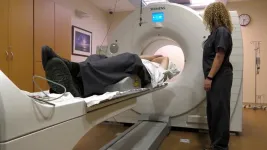(Press-News.org) Vienna, Austria- 30 March 2025
Sudden cardiac death (SCD) refers to an unexpected death of a person, believed to be caused by a heart-related issue. It occurs within one hour of the onset of symptoms in witnessed cases or within 24 hours of the person being last seen alive in unwitnessed cases.
The causes in people under the age of 39 are often a thickening of the heart muscle or an electrical problem with the heart. In older people, SCD is more likely to be caused by a narrowing of the blood vessels that supply the heart.
Previous research has shown1 that patients with psychiatric disorders have an increased all-cause mortality as well as double the risk of sudden cardiac death across all age groups. However, the impact of antidepressant exposure on SCD risk has so far been unclear.
In new research presented at EHRA 2025, a scientific congress of the European Society of Cardiology, researchers show that, compared with the general population with no history of antidepressant (AD) use, individuals with a history of AD use have an increased risk of SCD, which varies based on age and time of exposure.
The authors examined all deaths in Denmark among residents aged 18-90 years in 2010 by reviewing all death certificates and autopsy reports. Deaths were categorised as non-SCD or SCD based on the available information. Exposure to AD was defined by redemption of a prescription for AD medication at least twice in one year over a period of 12 years before the year of follow-up (2010). Furthermore, exposure time was divided into two groups: 1 to 5 years and 6 or more years.
Among the 4.3 million residents in 2010 aged 18-90 years, there were a total of 45,701 deaths and 6002 cases of SCD. A total of 643,999 inhabitants were exposed to AD medication prior to the year of follow-up. There were 1,981 sudden cardiac deaths in the AD cohort and 4,021 in the unexposed general population. The incidence rate ratio of SCD was significantly higher in the exposed groups compared to the general population across all age groups except for the age group 18-29 years, for whom the association was not statistically significant (see table 1, annex).
When the data was adjusted for age, sex and comorbidities, compared with the unexposed general population, the group exposed to antidepressants for 1 to 5 years had a 56% higher risk of sudden cardiac death, while those exposed to antidepressants for six or more years experienced a 2.2 times higher risk.
In individuals aged 30-39 years, compared with the unexposed general population, those with 1 to 5 years of antidepressant exposure were around three times more likely to suffer sudden cardiac death. This risk increased to five times higher for those with six or more years of AD exposure.
In individuals aged 50-59 years, compared with the unexposed general population, those exposed to antidepressants for 1 to 5 years saw their risk of sudden cardiac death doubled, while individuals exposed to antidepressants for 6 or more years had four times the risk of sudden cardiac death.
The differences in risk associated with varying periods of antidepressant exposure decreased in older groups. In individuals aged 70-79 years compared to the unexposed general population, those with 1-5 years AD exposure had a 1.83 or 83% times increased risk, whereas those with 6 years or more exposure had a 2.2 times increased risk of SCD.
In individuals aged 40-79 years, the SCD incidence rate ratio was significantly higher among persons with 6 or more years of exposure to AD compared to persons with 1-5 years of exposure (see table 2, annex). The increased risk differed for each ten-year age group, so that for those aged 40 to 49 years, the risk of SCD increased by 70% for those with 6 or more years of exposure compared to 1-5 years of exposure, and the corresponding increases for 50-59 years, 60-69 years, and 70-79 years were 100%, 40% and 20%, respectively. For persons aged 39 years and under and 80 years and over, the difference in increased risk between 6 years and 1-5 years of AD exposure was not statistically significant.
“Exposure time to antidepressants was associated with a higher risk of sudden cardiac death, and linked to how long the person had been exposed to antidepressants,” says study co-author Dr Jasmin Mujkanovic, Rigshospitalet Hjertecentret, Copenhagen, Denmark. “Those exposed for 6 years or more were at even more increased risk than those exposed for 1 to 5 years, when compared with people unexposed to antidepressants in the general population.”
On the potential reasons for the association, she adds: “The increased risk of sudden cardiac death may be attributed to the potential adverse effects of the antidepressants. However, the exposure time to antidepressants might also serve as a marker for more severe underlying illness. Additionally, the increase could be influenced by behavioural or lifestyle factors associated with depression, such as delayed healthcare seeking, and poor cardiovascular health. Further research is warranted.”
ENDS
ESC Press Office
Tel: +33 6 61 40 18 84
Email: press@escardio.org
Follow us on X @ESCardioNews
Notes to editors
Funding: the study received no external funding
Disclosures:LVKe has within the preceding three years been a consultant for Teva and Lundbeck. LVKø has received speaker’s honorarium from AstraZeneca, Boehringer, Novartis and Novo Nordisk. JT-H is a consultant for Johnson and Johnson, Microport, Boston, Cytokinetics and Leo Pharma, and has received funding from John and Birthe Family foundation. The remaining authors declare no conflicts of interests
References:
1 https://pubmed.ncbi.nlm.nih.gov/39438152/
Annex containing tables of exposure time and risk for each age group available here
About the European Society of Cardiology
The ESC brings together health care professionals from more than 150 countries, working to advance cardiovascular medicine and help people to live longer, healthier lives.
About the European Heart Rhythm Association
EHRA aims to improve the quality of life and reducing sudden cardiac death by limiting the impact of heart rhythm disturbances.
About EHRA 2025 #EHRA2025
Information for journalists about registration for EHRA 2025:
EHRA 2025 takes place from Sunday, 30 March , to Tuesday, 1 April at Messe Wien, Messeplatz 1, 1020 Vienna, Austria and online Explore the scientific programme
Free registration applies to accredited press.
Credentials: A valid press card or appropriate letter of assignment with proof of three recent published articles. Read the ESC media and embargo policy.
The ESC Press Office will verify the documents and confirm by email that your press accreditation is valid.
The ESC Press Office decision is final regarding all press registration requests.
END
Use of antidepressant medication linked to substantial increase in risk of sudden cardiac death
2025-03-30
ELSE PRESS RELEASES FROM THIS DATE:
Atrial fibrillation diagnosed in midlife is linked to a 21% increased risk of dementia at any age and a 36% higher risk of early-onset dementia
2025-03-30
Vienna, Austria- 31 March 2025
New research presented at the EHRA 2025, a scientific congress of the European Society of Cardiology, shows that the presence of atrial fibrillation (AF) increases the risk of future dementia by 21% in patients diagnosed with AF under 70 and the risk of early-onset dementia (diagnosed before age 65 years) by 36%. The association was stronger in younger adults and was lost in older adults aged 70 years and over.
“This is the largest European population-based study evaluating the association between AF and dementia,” say the authors that include Dr Julián Rodriguez ...
Mode of death in patients with heart failure with mildly reduced or preserved ejection fraction
2025-03-30
About The Study: Among patients with heart failure with mildly reduced ejection fraction/heart failure with preserved ejection fraction in the Finerenone Trial to Investigate Efficacy and Safety Superior to Placebo in Patients With Heart Failure randomized clinical trial, higher proportions of cardiovascular and overall mortality in those with ejection fraction less than 50% were related principally to higher proportions of sudden death. A clear treatment effect of finerenone on cardiovascular or cause-specific mortality was not identified, although the trial was likely underpowered for these outcomes.
Corresponding Author: To contact the corresponding author, Akshay S. Desai, ...
Intravenous ferric carboxymaltose in heart failure with iron deficiency
2025-03-30
About The Study: In patients with heart failure and iron deficiency, ferric carboxymaltose did not significantly reduce the time to first heart failure hospitalization or cardiovascular death in the overall cohort or in patients with a transferrin saturation less than 20%, or reduce the total number of heart failure hospitalizations vs placebo.
Corresponding Author: To contact the corresponding author, Stefan D. Anker, MD, PhD, email s.anker@cachexia.de.
To access the embargoed study: Visit our For The Media website at this link https://media.jamanetwork.com/
(doi:10.1001/jama.2025.3833)
Editor’s ...
Artificial intelligence in the prevention of sudden death
2025-03-30
Many cases of sudden cardiac death could be avoided thanks to artificial intelligence. As part of a new study to be published in European Heart Journal, a network of artificial neurons imitating the human brain was developed by researchers from Inserm, Paris Cité University and the Paris public hospitals group (AP-HP), in collaboration with their colleagues in the USA. During the analysis of data from over 240 000 ambulatory electrocardiograms, this algorithm identified patients at risk of a serious arrhythmia that was capable of triggering cardiac arrest within the following 2 weeks in over 70% of cases.
Each ...
Oral semaglutide vastly reduces heart attacks, strokes in people with type 2 diabetes
2025-03-29
Both the injectable and oral forms of semaglutide, a glucagon-like peptide-1 receptor agonist, have gained recent attention for their effectiveness against weight gain, high blood sugar, and even alcohol cravings.
A new clinical trial, co-led by endocrinologist and diabetes expert John Buse, MD, PhD, and interventional cardiologist Matthew Cavender, MD, MPH, at the UNC School of Medicine has shown that the oral form of semaglutide can significantly reduce cardiovascular events in people with type 2 diabetes, atherosclerotic cardiovascular disease, and/or ...
Prothrombin complex concentrate vs frozen plasma for coagulopathic bleeding in cardiac surgery
2025-03-29
About The Study: In this unblinded randomized clinical trial, prothrombin complex concentrate had superior hemostatic efficacy and safety advantages to frozen plasma among patients requiring coagulation factor replacement for bleeding during cardiac surgery.
Corresponding Author: To contact the corresponding author, Keyvan Karkouti, MD, email keyvan.karkouti@uhn.ca.
To access the embargoed study: Visit our For The Media website at this link https://media.jamanetwork.com/
(doi:10.1001/jama.2025.3501)
Editor’s Note: Please see the article for additional information, including other authors, author contributions and affiliations, ...
Who needs a statin? New study compares prescribing recommendations based on traditional risk factors vs. coronary artery calcium scoring
2025-03-29
A new study by researchers at Intermountain Health in Salt Lake City aims to determine the best method to screen and evaluate patients who are at risk of developing coronary heart disease and which patients would benefit from taking a statin medication to lower cholesterol.
Currently, cardiologists determine a patient’s need for a statin based on traditional risk factors, using the Pooled Cohort Equation (PCE), which calculates coronary risk by assessing the risk factors of age, sex, total and HDL cholesterol levels, blood pressure, and whether someone ...
Finerenone and atrial fibrillation in heart failure
2025-03-29
About The Study: The efficacy of finerenone was consistent regardless of atrial fibrillation status in this study. New-onset atrial fibrillation was associated with a substantially higher risk of subsequent outcomes.
Corresponding Author: To contact the corresponding author, John J. V. McMurray, MD, email john.mcmurray@glasgow.ac.uk.
To access the embargoed study: Visit our For The Media website at this link https://media.jamanetwork.com/
(doi:10.1001/jamacardio.2025.0848)
Editor’s Note: Please see the article for additional information, including other authors, ...
Low coronary artery calcium score is associated with an excellent prognosis regardless of a person’s age, new study finds
2025-03-29
Having a coronary artery calcium (CAC) score of zero has generally been accepted as a marker of a very low risk of having a cardiac event within the next five years. However, age is a strong contributor to coronary risk, with risk increasing markedly as people age.
Whether age-related risk factors diminish the low risk predicted by a zero coronary artery calcium score has been uncertain – until now.
A large new study of more than 40,000 patients from heart researchers at Intermountain Health in Salt Lake City finds that a zero coronary artery calcium score continues to be an accurate indicator of a low risk for a coronary ...
Groundbreaking consensus statement on conduction system pacing released: a major milestone in the evolution of pacing therapy
2025-03-29
Vienna, 30 March 2025– The European Society of Cardiology (ESC) has released a groundbreaking consensus statement on conduction system pacing (CSP), marking a significant milestone in the evolution of pacing therapy. The document was officially presented today at the EHRA 2025 congress in Vienna and simultaneously published in EP Europace.
For over 50 years, right ventricular pacing has been a standard treatment for slow heart rhythms. However, in some patients, this approach can lead to reduced heart function and even heart failure. Furthermore, biventricular pacing ...


